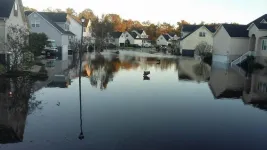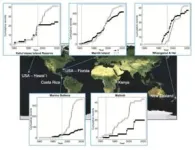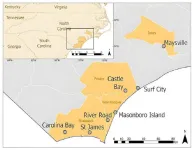(Press-News.org) LAWRENCE — Around the globe, communities at risk from repeated flooding due to climate change face stark decisions. Some communities in peril of flooding may resolve, or be urged, to relocate to a safer location — something known as “managed retreat.” In the United States, flood-prone communities in coastal states like Louisiana and Alaska already have commenced managed retreat inland.
“It's retreating from risk, and we hope to provide decision support for the equitable implementation of retreat to build climate resilience,” said Elaina Sutley, associate professor of civil, environmental & architectural engineering at the University of Kansas.
Sutley is leading a three-year, $650,000 multidisciplinary study of managed retreat as part of a collaboration funded by the National Science Foundation and Canada’s New Frontiers in Research Fund via the 2023 International Joint Initiative for Research on Climate Change Adaptation and Mitigation Competition. Each agency funds the scientists at institutions in their respective countries.
The KU-headed partnership is dubbed “Retreating from risk (RFR): Decision-supports for the equitable implementation of retreat to build climate resilience.” Beyond KU, the effort involves Stony Brook and Texas Tech universities as well as researchers abroad.
“This is multidisciplinary collaboration between partners in the United States, Canada and Indonesia, who are all faced with flood disasters, whether that's coastal flooding associated with a hurricane or not,” Sutley said. “Inland flooding, seasonal flooding and repeated nuisance flooding — all three of these countries are facing it. Managed retreat has become a somewhat common adaptation strategy, particularly for flooding. The U.S. team will also consider retreating from wildfire disasters.”
While the study of managed retreat will focus on communities suffering from floods and wildfires, Sutley said the work could guide decision making for communities faced with different kinds of repeating natural disasters.
“Floods aren’t the only hazard this work is applicable to,” she said. “In many ways, flooding isn’t much different from a lot of hazards. How can we best move out of a place that is going to be hit repeatedly by disaster and has a record of being hit repeatedly?”
The KU researcher said the goal is to understand how managed-retreat approaches are being considered across many geographies, nations and cultures, then identify any key strategies that are shared, as well as understand where there are necessary differences.
“There are many different strategies,” Sutley said. “In the U.S., one of the most common ways we see managed retreat executed is with the buyout program from FEMA. This project, through our international collaboration, is trying to understand how different cities and governments — faced with different types of hazards, with different political, social and cultural contexts — have considered managed retreat. Did they successfully adopt it or one of its strategies? What challenges or barriers did they run into that prevented them from adopting it? What challenges came up when they went through this process? What can we learn within countries across geographies, and then across countries and geographies?”
Sutley said the team would take care to seek and incorporate Indigenous knowledge and practices where applicable, partnering with communities that may already have faced relocation or exploitation historically.
“The new Frontiers Research Fund of Canada require that you consider and include Indigenous communities,” Sutley said. “That's part of some of their equity legislation. It’s key to work with people who have relationships and experience doing this — taking time to build trust that's needed. Those are going to be key tenets. While the locations we've identified in the United States to partner with aren’t on reservations, for example, they certainly do have people who’ve been disproportionately impacted by historical and modern-day policies and practices that our team is very sensitive to.”
From these studies, the collaborating researchers will document political, financial, social, cultural and policy barriers to adopting managed retreat. The study will include data collection via surveys, interviews, focus groups and roundtable discussions, ensuring the work incorporates viewpoints from people involved in the decision-making process at all levels.
“How can we use all of that information to guide future communities who may consider managed retreat as an option?” Sutley said. “What are the pros? What are the things that make this a really great option in these different areas? Really, I think we're going to hear very different things from one community to the next but also from one kind of stakeholder in that decision process to the next. So, we're taking more of an open-ended approach.”
The results will help guide policymakers, community leaders and future research efforts. The researchers plan to produce “contextually relevant decision-support tools,” such as a training module, best-practices guidebook or conversation toolkits, to guide community leaders in engaging constituents on managed retreat.
Sutley said managed retreat is an urgent issue and the work would yield tools at the end of its three-year span.
“Any research that can offer guidance is needed as soon as possible,” she said. “We're really trying to learn from communities at different stages of dealing with this question — those who are over and done with it, those at the beginning and those in the middle. We're studying communities at all these different stages so we can understand how the process unfolds in these different contexts. The findings are meant to be relevant both immediately and long term.”
END
Research will establish best ‘managed retreat’ practices for communities faced with climate change disaster
2024-07-19
ELSE PRESS RELEASES FROM THIS DATE:
Marshall University awarded grant to further fentanyl addiction research
2024-07-19
HUNTINGTON, W.Va. – Marshall University was awarded a $3.3 million grant (#R01DA057931) from the National Institute on Drug Abuse (NIDA) to examine the genetic mechanisms that underlie fentanyl addiction.
In 2022, fentanyl overdose was the leading cause of death for U.S. adults aged 18 to 45, according to Families Against Fentanyl (2023).
“This alarming statistic highlights the urgent need to understand why some people are more susceptible to fentanyl addiction,” ...
Wash U researchers shine light on amyloid architecture
2024-07-19
By Leah Shaffer
Amyloid-beta (A-beta) aggregates are tangles of proteins most notably associated with neurodegenerative diseases like Alzheimer’s. Despite its constant stint in the limelight, however, researchers have been unable to get a good understanding of how A-beta comes together and breaks apart.
“The way A-beta behaves in a variety of environments, including the human brain, is elusive,” said Brian Sun, an electrical systems and engineering alumnus of Washington University in St. Louis who is now an MD/PhD student in the School of Medicine.
“There’s an understanding of growth and decay that isn’t ...
New dawn for space storm alerts could help shield Earth's tech
2024-07-19
New dawn for space storm alerts could help shield Earth's tech
Royal Astronomical Society press release
RAS PR 24/22 (NAM 8)
For immediate release
Space storms could soon be forecasted with greater accuracy than ever before thanks to a big leap forward in our understanding of exactly when a violent solar eruption may hit Earth.
Scientists say it is now possible to predict the precise speed a coronal mass ejection (CME) is travelling at and when it will smash into our planet – even before it has fully erupted from ...
Tomorrow’s super battery for electric cars is made of rock
2024-07-19
In 10 years, solid-state batteries made from rock silicates will be an environmentally friendly, more efficient and safer alternative to the lithium-ion batteries we use today. Researcher at DTU have patented a new superionic material based on potassium silicate - a mineral that can be extracted from ordinary rocks.
It is the battery in your electric car that determines how far you can drive on one charge and how quickly you can re-charge. However, the lithium-ion battery, the most widely used electric car battery today, has its limitations— in terms of capacity, safety and also availability. ...
Fecal immunochemical test screening and risk of colorectal cancer death
2024-07-19
About The Study: In this nested case-control study, completing fecal immunochemical test was associated with a lower risk of overall death from colorectal cancer, particularly in the left colon, and the associations were observed across racial and ethnic groups. These findings support the use of fecal immunochemical test in population-based screening strategies.
Corresponding Author: To contact the corresponding author, Chyke A. Doubeni, M.D., M.P.H., email chyke.doubeni@osumc.edu.
To access the embargoed ...
Long-term use of oral corticosteroids and safety outcomes for patients with atopic dermatitis
2024-07-19
About The Study: Oral corticosteroid use of more than 90 days per year among individuals with atopic dermatitis was associated with a small increased risk of composite adverse outcomes in this large population-based case-control study. Future investigations are warranted to confirm this potential risk of adverse events (AEs) associated with long-term use of oral corticosteroids for patients with exacerbations of atopic dermatitis, and health care professionals should thoroughly weigh the benefits associated with oral corticosteroids ...
Diagnosing solid lesions in the pancreas with multimodal AI
2024-07-19
About The Study: In this randomized crossover trial of diagnosing solid lesions in the pancreas with or without artificial intelligence (AI) assistance, the joint-AI model demonstrated positive human-AI interaction, which suggested its potential to facilitate a clinical diagnosis. Nevertheless, future randomized clinical trials are warranted.
Corresponding Authors: To contact the corresponding authors, email Aiming Yang, M.D. (yangaiming@medmail.com.cn) and Bin Cheng, M.D. (b.cheng@tjh.tjmu.edu.cn).
To access the embargoed study: Visit our For The Media website at this link https://media.jamanetwork.com/
(doi:10.1001/jamanetworkopen.2024.22454)
Editor’s ...
Trillions lost in worker productivity due to eco anxiety and ‘lie-back’ lifestyles
2024-07-19
Could nature and climate anxieties predict future social behaviours, in the same way that consumer sentiment predicts purchasing and investment?
The suggestion is made in the Cell Press journal One Earth, by Griffith University’s Professor Emeritus Ralf Buckley, in a preview of an article led by Professor Thomas Pienkowski in the UK.
Professor Buckley said the international Global Burden of Disease Study had shown that anxiety and depression were widespread and worsening.
“Economic costs are up to 16% of global GDP, with 19 days per year on average lost ...
University of Cincinnati study examines impact of incarceration on youth health
2024-07-19
Researcher Samantha Boch has studied the impact of incarceration on child and family health for more than a decade.
Her latest research examines the health records and health care use of youth, individuals under age 21, who likely have been involved or whose families have been involved in the justice system. The challenge was identifying youth who have been impacted by mass incarceration, as most health care systems don’t routinely ask about incarceration. Families may not disclose that information due to stigma, fear of child protective services involvement, ...
Wetland wonders unfold: Aerial systems shed light on ecosystem services
2024-07-19
A cutting-edge study revolutionizes coastal wetland mapping by integrating unmanned aerial systems with light detection and ranging (LiDAR) and multispectral sensors. This innovative approach provides detailed elevation data and vegetation analysis, enabling highly accurate classifications of diverse wetland types. The research advances conservation by offering a scalable, efficient, and cost-effective method that is instrumental in climate change mitigation strategies and informs policy-making for coastal resilience.
Coastal wetlands, situated at the junction of land and water, are vital ecosystems known for their high productivity. They play a key role in carbon ...






